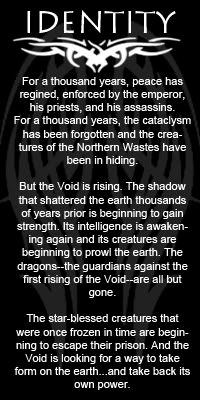Social Structure
Sept 1, 2008 19:37:50 GMT -8
Post by flippedside on Sept 1, 2008 19:37:50 GMT -8
The following details the social structures of Rhyallia. Use this to create your character's occupation.
Societal Structure in Order:
Emperor/Empress (Earth Stone Holder)
Priests/Priestesses of the Stones (A new religion has sprung up around the stones. Supposedly, the goal is to find the stones and use their power to heal the earth. The highest members of the order advise the Emperor (or Empress) on how to most effectively use the stones. In fact, the religious order has its own goals of laying claim to all five stones and using them to their own ends—all good ends, of course. The highest members of this order are also sorcerers/sorceresses. Lesser members may have minor or ongoing training—depending on their ambitions and abilities).
Lords/Ladies (Members of the court down to lesser nobility. The nobility is divided into Houses—High Houses and Lesser Houses. The High Houses are the most powerful and affluent. These would be the lords and ladies of the court. Each lord/lady owns a section of land that they control—under the power of the Emperor/Empress).
Sword-Maiden (A very unusual class. Women who have chosen to become warriors and vowed themselves to the sword, rather than marriage. Sword-Maids are very honorable, although they are somewhat rare and tend to be on the fringes of society).
Knight of the Emperor (A warrior—that is, a soldier who usually fights by themselves rather than as part of an army—who is sworn to the Emperor/Empress himself. Like Sword-Maidens, they are honorable but uncommon. Most choose to join the army rather than the more demanding post of Knight. Knights may rich or poor and may be commanders in the army).
Soldiers (There are two divisions: The Palace Guards and the regular army. The Palace Guards hold considerably more power and prestige than the regular soldiers).
Scholars (An important class. Their duty is the keeping of history and learning of power—related to the magical power of the stones. They are also astronomers and alchemists—they do not “do” magic, only the Priests/Priestesses of the Stone can do magic).
Healers/Doctors (Exactly what their name implies: they heal people).
Merchants/Craftsmen (Regular people who live in towns or cities).
Farmers/Sailors/Fishermen (Regular people who work the land or the sea).
Hunter/Explorer (On the fringes of society and not well thought of. They are guides and travelers who know the land and usually travel it on their own. Very tough).
Mercenaries/Assassins[/color] (Not quite at the bottom, but close. Tend to be highly distrusted—particularly since they work for pay, not honor).
Thieves/Outcasts/Rebels [/color](The most despised classes of people. Outcasts/Rebels tend to be those who hate the government, the unfair division of power, etc. They may have a reason for how they became an outcast, or they may have chosen it for themselves. The rebels have banded together into a pathetic army and efficient spy network. Thieves are thieves and can be anyone from a child pickpocket to a band working efficiently at stealing and smuggling goods).
Notes on Social Structure:
Use the list to create the occupation of your character. The exact occupation of the character doesn’t have to listed. For example, a jeweler isn’t on the list, but on the form you would write:
Occupation: Craftsman/Jeweler
If you wanted, you could then add an explanation of what that meant (although that’s enough information for that category, since we already have an idea of what a jeweler is/does).
You may also create a new occupation. However, be sure to give us information on what the occupation is and where it fits into society. (A Judge might be an example. You would need to state where and when the judge works and what they do.)
[/size]








